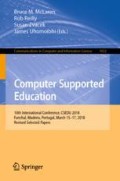Abstract
Discussion which consists of several Q&A segments (question and answer pairs) is often considered as one of the most familiar types of intellectual and creative activities at meetings. Evaluating students’ answer-quality of Q&A segments in discussion and giving them feedback can effectively help them improve their discussion skills. Considering that the discussion process is a type of cognitive activity, which could result in changes in certain physiological data, such as heart rate (HR) variability (HRV). In this study, we argue that students’ HR data can be used to effectively evaluate the answer-quality of their Q&A segments and as a method of automatic evaluation of students’ discussion-skill compared with using traditional NLP such as semantic analysis. In order to confirm this, we used a non-invasive device, i.e., Apple Watch, to collect real-time updated HR data of students during their discussions in our lab-seminar environment, their HR data were analyzed based on Q&A segments, and three machine-learning models were generated for evaluation: logistic regression, support vector machine, and random forest. The significant HR and HRV features (metrics) were also discussed using a feature selection method. Comparative experiments were conducted involving semantic data of Q&A statements alone and a combination of HR and semantic data. We also gave an experimental investigation on HR and HRV features robustness on the new data set we collected additionally.
Access this chapter
Tax calculation will be finalised at checkout
Purchases are for personal use only
References
Nagao, K., Kaji, K., Yamamoto, D., Tomobe, H.: Discussion mining: annotation-based knowledge discovery from real world activities. In: Aizawa, K., Nakamura, Y., Satoh, S. (eds.) PCM 2004. LNCS, vol. 3331, pp. 522–531. Springer, Heidelberg (2004). https://doi.org/10.1007/978-3-540-30541-5_64
Nagao, K., Tehrani, M.P., Fajardo, J.T.B.: Tools and evaluation methods for discussion and presentation skills training. Smart Learn. Environ. 2(5) (2015). https://doi.org/10.1186/s40561-015-0011-1
Patil, S., Lee, K.: Detecting experts on quora: by their activity, quality of answers, linguistic characteristics and temporal behaviors. Soc. Netw. Anal. Min. 6(5), 1–11 (2016)
Agichtein, E., Castillo, C., Donato, D., Gionis, A., Mishne, G.: Finding high-quality content in social media. In: Proceedings of the 2008 International Conference on Web Search and Data Mining, pp. 183–194. ACM (2008)
Camm, A.J., et al.: Heart rate variability: standards of measurement, physiological interpretation and clinical use. Eur. Heart J. 17(3), 354–381 (1996)
Luque-Casado, A., Zabala, M., Morales, E., Mateo-March, M., Sanabria, D.: Cognitive performance and heart rate variability: the influence of fitness level. PLoS ONE (2013). https://doi.org/10.1371/journal.pone. 0056935
Pereira, T., Almeida, P.R., Cunha, J.P., Aguiar, A.: Heart rate variability metrics for fine-grained stress level assessment. Comput. Methods Programs Biomed. 148, 71–80 (2017)
Peng, S., Nagao, K.: Automatic evaluation of presenters’ discussion performance based on their heart rate. In: Proceedings of the 10th International Conference on Computer Supported Education, CSEDU 2018 (2018)
Jeon, E., Park, H.: Development of a smartphone application for clinical-guideline-based obesity management. Healthc. Inform. Res. 21(1), 10–20 (2015)
El-Amrawy, F., Nounou, M.I.: Are currently available wearable devices for activity tracking and heart rate monitoring accurate, precise, and medically beneficial? Healthc. inform. res. 21(4), 315–320 (2015)
Wang, X., et al.: Genetic influences on heart rate variability at rest and during stress. Psychophysiology 46(3), 458–465 (2009). https://doi.org/10.1111/j.1469-8986.2009.00793.x
Guyon, I., Weston, J., Barnhill, S., Vapnik, V.: Gene selection for cancer classification using support vector machines. Mach. Learn. 46(1), 389–422 (2002)
Author information
Authors and Affiliations
Corresponding author
Editor information
Editors and Affiliations
Rights and permissions
Copyright information
© 2019 Springer Nature Switzerland AG
About this paper
Cite this paper
Peng, S., Ohira, S., Nagao, K. (2019). Automatic Evaluation of Students’ Discussion Skill Based on their Heart Rate. In: McLaren, B., Reilly, R., Zvacek, S., Uhomoibhi, J. (eds) Computer Supported Education. CSEDU 2018. Communications in Computer and Information Science, vol 1022. Springer, Cham. https://doi.org/10.1007/978-3-030-21151-6_27
Download citation
DOI: https://doi.org/10.1007/978-3-030-21151-6_27
Published:
Publisher Name: Springer, Cham
Print ISBN: 978-3-030-21150-9
Online ISBN: 978-3-030-21151-6
eBook Packages: Computer ScienceComputer Science (R0)

